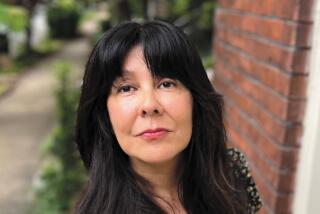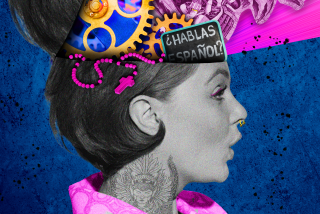Why Jamaica Kincaid loves the OED
Award-winning author Jamaica Kincaid began her talk at ALOUD’s program “Empire of Words: An Unsentimental Journey to the Birth of the OED” on Tuesday night with a story about her childhood in the Caribbean island of Antigua. As punishment for acting out during class, a 10-year old Kincaid was forced to read John Milton’s “Paradise Lost.”
“I fell in love with Lucifer,” the author joked at the sold-out event. She continued that the reason she writes long sentences, as critics seem to complain, was because she read three books at a young age: “Paradise Lost,” the King James Bible, and the Oxford English Dictionary.
“My mother gave me a concise copy of the Oxford English Dictionary and I read it like a book,” she said.
As she spoke, Kincaid’s phone went off.
Digging through her purse to turn it off, she joked: “See, this is why I was getting in trouble.”
Thus began the evening conversation that paired Kincaid with Sarah Ogilvie, Stanford University’s Lecturer of Linguistics and author of “Words of The World: A Global History of the Oxford English Dictionary” with Cambridge University Press. The discussion is part of a month-long celebration of the Oxford English Dictionary presented by the Library Foundation’s ALOUD literary series and the Los Angeles Public Library.
Ogilvie shared stories of her stint as chief editor of Oxford Dictionaries, where she had access to the archives that showed the very start of how the dictionary was conceived. As Ogilvie explained, volunteer readers were asked to go through their reading libraries and mail in slips of paper with English words they had selected to be included in the dictionary.
“It was very interesting for me to see how men and women responded differently to the words they selected,” Ogilvie said.
One example she cited was when two volunteers were both reading a journal of an African journey. The male volunteer submitted words such as “table” and “chair,” whereas the woman reading the same book selected more exciting words.
Kincaid concluded that because women’s lives were much more confined at that time, it made sense for them to be attracted to the more exotic, adventurous words. She recalled being attracted to the word “gloaming” in a copy of “Jane Eyre” when she was 10 years old.
“It was such a foreign concept. Gloaming,” she said. “There is no gloaming in the Caribbean. It’s just night or day. That’s it.” She found a way to incorporate the word in her writing when she was 28 years old.
According to Ogilvie, Kincaid is quoted in the latest version of the Oxford English Dictionary 14 times for the use of words that are particular to the Caribbean such as “soursop,” and antiquated British words, such as “wanton,” in reference to music or color. Even the word “sublime” has a different connotation for Kincaid.
“Sublime was something awful, even terrifying. Not the way people use it now,” Kincaid said, with her hands in fists. The audience laughed when she expressed how much she couldn’t stand the word.
The conversation ended with Ogilvie explaining how the American influence has taken over the dictionary, and with Kincaid telling the audience the story of how she came to travel to New York city when she was 17 years old and eventually ended up working at the New Yorker.
“I happened to do things that I probably should not have done,” she joked without going into specific details.
The OED celebration continues this weekend with “A Very L.A. Spelling Bee,” where participants of all ages will be able to compete in a dual language English and Spanish spelling bee.
More to Read
Sign up for our Book Club newsletter
Get the latest news, events and more from the Los Angeles Times Book Club, and help us get L.A. reading and talking.
You may occasionally receive promotional content from the Los Angeles Times.






